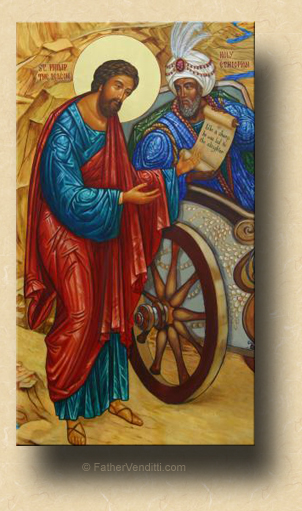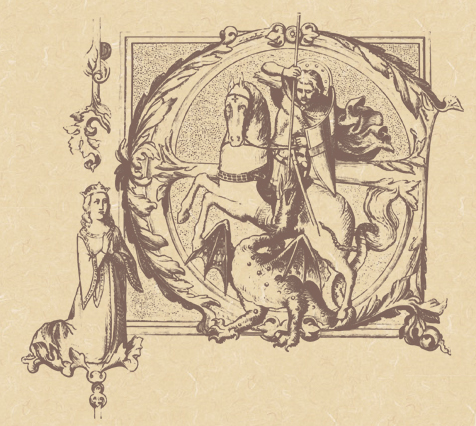The Blessed Times in Which We Live.
The Third Thursday of Easter; or, the Memorial of Saint George, Martyr.
Lessons from the feria, according to the ordinary form of the Roman Rite:
• Acts 8: 26-40.
• Psalm 66: 8-9, 16-17, 20.
• John 6: 44-51.
The Second Thursday after Easter; and, the Commemoration of Saint George, Martyr.
Lessons from the dominica, according to the extraordinary form of the Roman Rite:
• I Peter 2: 21-25.
• John 10: 11-16.*
The Solemn Holy Day of the Holy, Victorious & Great Martyr George the Wonder-Worker.
Lessons from the menaion, according to the typicon of the Byzantine-Ruthenian Rite:
[At Vespers...]
• Isaiah 43: 9-14.
• Wisdom 3: 1-9.
• Wisdom 4: 7-15.
[At Matins...]
• Luke 12: 2-12.
[At the Divine Liturgy...]
• Acts 12: 1-11.
• John 15: 17—16-2.
FatherVenditti.com
|
 2:56 PM 4/23/2015 — It's wonderful how Holy Mother Church presents to us, in these apostolic lessons from Acts, her own story. Tuesday we read about the death of the archdeacon and first martyr, Stephen; yesterday we saw how Stephen's death marked the beginning of a wholesale persecution of the Church in Jerusalem, resulting in many of the followers of Christ being driven out of the city into the countryside and beyond, where they preached our Lord, God and Savior, Jesus Christ, and making many converts to the faith. I had made the suggestion—and you can take it for what you will—that had it not been for that persecution, the Church in Jerusalem would have probably stayed in Jerusalem, that the faith begins to spread precisely because of the persecution simply because, even though they were running away, the disciples of our Lord could not resist the drive to preach Him to everyone they met along the way, and how this illustrated so perfectly what that erudite Father of the Church, Tertullian, said in the second century: sanguis martyrum semen christianorum—“the blood of the martyrs is the seed of new Christians” (Apol., 50, 13: CCL 1, 171). 2:56 PM 4/23/2015 — It's wonderful how Holy Mother Church presents to us, in these apostolic lessons from Acts, her own story. Tuesday we read about the death of the archdeacon and first martyr, Stephen; yesterday we saw how Stephen's death marked the beginning of a wholesale persecution of the Church in Jerusalem, resulting in many of the followers of Christ being driven out of the city into the countryside and beyond, where they preached our Lord, God and Savior, Jesus Christ, and making many converts to the faith. I had made the suggestion—and you can take it for what you will—that had it not been for that persecution, the Church in Jerusalem would have probably stayed in Jerusalem, that the faith begins to spread precisely because of the persecution simply because, even though they were running away, the disciples of our Lord could not resist the drive to preach Him to everyone they met along the way, and how this illustrated so perfectly what that erudite Father of the Church, Tertullian, said in the second century: sanguis martyrum semen christianorum—“the blood of the martyrs is the seed of new Christians” (Apol., 50, 13: CCL 1, 171).
And we see this even today: when we see Christians—whole families and villages—being marched to the sea to their deaths by Mohammedan terrorists when they could so easily save themselves by simply denying our Lord and embracing that horrendous religion, we are reminded of how small our faith is compared to theirs. Among the Catholics of the middle east, there is no agitation about abortion, contraception, women priests, gay marriage, or any of the issues that Catholics like to debate about in countries like ours where Christians live fat, dumb and happy; they're too busy dying for the faith. How they put us to shame!
In today's apostolic lesson from Acts, Saint Luke tells us the story of one of these conversions. The Apostle Philip, running away from the persecutions in Jerusalem, encounters an Ethiopian eunuch, an official from the court of Queen Candace, who ruled Ethiopia at the time. Now, many Ethiopians, believe it or not, were Jews. It's unclear from the text whether this man was a Jew—probably he was not—or a convert to the Jewish faith, or simply someone sympathetic to the Jewish faith; but, in any case, he's sitting in his chariot taking a rest from his journey and reading the Book of the Prophet Isaiah; in fact, Saint Luke tells us exactly what passage from Isaiah he was reading, and it should sound familiar to you: it was the very passage we had looked at back toward the end of Lent,** that portion of Isaiah called “The Song of the Suffering Servant,” whom the Fathers of the Church had always identified with our Lord, God and Savior, Jesus Christ. Saint Philip is very bold: he walks right up to this man, who is obviously of a much higher class than himself, and asks him if he understands what he's reading. The Ethiopian eunuch is very honest with him, and tells him, no, he doesn't really, but that he'd be very grateful if Philip could explain it to him.
Well, that's all the impetus that the apostle needs; beginning with that passage from Isaiah, he preaches our Lord to him, and does such a good job that the Ethiopian asks then and there to be baptized. The instant he's baptized, Philip disappears, in much the same way that our risen Lord disappeared as soon as He had offered Holy Mass for the disciples He met on the road to Emmaus. Our Lord disappeared because, with the Blessed Sacrament present, His human form was no longer needed; He was now present in the Eucharist. Philip disappears as soon as the Ethiopian is baptized because his job is now done, and he must be off to make other converts.
All of this is just icing on the cake in the story of how the war of secularism and evil against the Church of Jesus Christ always results in a Church which is stronger and more committed to the faith. Back in Jerusalem, the Scribes and Pharisees, under the leadership of the Pharisee Saul, thought that by killing Stephen and driving the Christians out of the city, they were wiping out the new religion; but, faith is like a chemical fire: if you attempt to put it out by dousing it with water, all you really end up doing is spreading it around and making it bigger.
For us, sitting at home in front of our television sets, wringing our hands over the war against the Church, whether prosecuted by the followers of Islam in the middle east or by our own government here at home, it's crucial, as part of our practice of the virtue of Hope, to keep the big picture in mind. We should all make signs with Tertullian's motto on it and paste them over our television sets as a reminder that hatred for the Church is always a sign that the Church is on the way up.
Tertullian, by the way, is not a saint; he had spent some years with a group of second century heretics called the Montanists, named after their founder, a man named Montanus, but he returned to the true faith and was reconciled to the Church before his death. The Montanists believed that the individual could receive private revelations from the Holy Spirit which could supersede the authority of the Church and even of the Scriptures. In his defense, during Tertullian's lifetime the Montanist issue was still being debated in the Church, and he was already long dead by the time they were finally excommunicated, so we can't really say that his association with them was sinful, especially since he returned, as I said, to a more orthodox faith before his death. His dabbling with Montanism was enough for the Church to refrain from proclaiming him a saint, but he is regarded as an important Father of the Church, whose many writings helped form the theology of the Church in the first four centuries. He wrote a lot about martyrdom because persecution was the common experience of all Christians during the time he lived, and it was the example of Christian martyrs that probably brought him back to the true faith before his death; so, he saw first hand the truth of that line of his we've quoted now so many times: “The Blood of the martyrs is the seed of new Christians.”
But we can see the truth of it, too, whether it's being played out in the poor countries of the middle east where Christians are being put to the sword by the adherents of a pseudo-religion that kills anyone who doesn't accept it, or whether it's played out in a rich country like ours, where Christians who stand up for the teachings of the Gospel have their jobs, their business, their homes threatened by a government and media establishment which persecutes and vilifies whoever disagrees with it. But in either case, we have to practice the virtue of hope; as I said, the faith is like a chemical fire: the more water you pour on it in your futile attempt to snuff it out, the bigger it grows. These are, indeed, blessed times in which we live.

* In the extraordinary form of the Roman Rite, outside of privileged seasons, the lessons for ferial days are those of the preceding Sunday; also, from Easter Saturday until the end of Paschaltide, the Gradual Psalm is omitted.
** Cf. the homily for the Fifth Wednesday of Lent.
|

